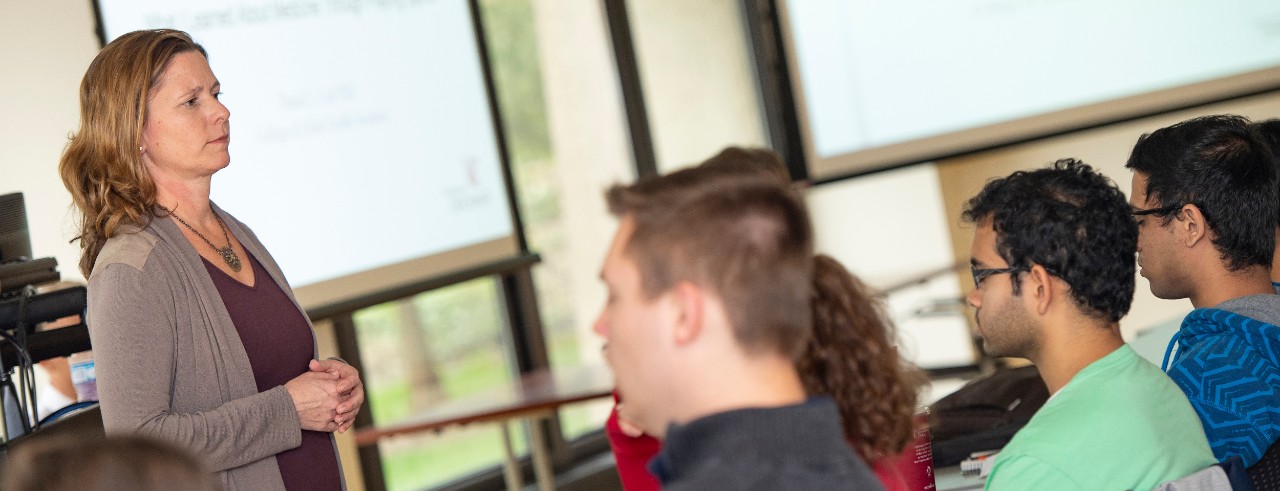
Integrative health graduate certificate program approved
Program joins other integrative health and wellness educational offerings
The University of Cincinnati Academic Committee has given final approval to a graduate certificate in integrative health. The first students are expected to enroll in the program this fall.
The program will be housed in the UC Center for Integrative Health and Wellness (CIHW) at the College of Medicine. The CIHW already offers an undergraduate certificate program, which began in 2018, a minor in integrative health, which was approved last year, and a certificate in yoga studies. Preliminary work has begun on developing a possible one-year master’s program in integrative health and wellness that is hoped to be in place by 2025.
It is expected that 10 students will be enrolled in the program this fall with the program growing by an additional five students each year. There are currently 36 students enrolled in the undergraduate certificate and minor programs.
“With only a handful of graduate programs in integrative medicine and health available across the country, this graduate certificate program will advance the training of medical and health professions students, physicians and other multidisciplinary health care professionals in evidence-based integrative health practices and principles,” says Sian Cotton, PhD, Turner Farm Foundation Endowed Chair and professor in the Department of Family and Community Medicine and director of the CIHW. Cotton also will serve as the graduate certificate program director.

Sian Cotton, PhD, Turner Farm Foundation Endowed Chair and professor in the Department of Family and Community Medicine and director of the UC Center for Integrative Health and Wellness. (Photo: Colleen Kelley/UC Creative + Brand)
Kelly Lyle, educational coordinator in the CIHW, says the 15-credit program will have three required core courses: Fundamentals of Integrative Health and Wellness, Science and Practice of Mind-Body Medicine and Self-care and Mental Well-being. Students will complete two additional elective courses. Among those offered will be Stress Reduction, Foundation of Health Promotion and Education, Health Promotion and Education Program Planning, Health Promotion and Education Measurement and Evaluation, Music and Health, Traditional Chinese Medicine and Acupuncture, Mindfulness-based Stress Reduction and Compassionate Care and Integrative Gut Health.
The expectation is that the certificate program will not only be of interest to current UC graduate students, but also to health professionals throughout the Cincinnati community and beyond.

Kelly Lyle (Photo: Colleen Kelley/UC Creative + Brand)
“Providing graduate level instruction and certification allows us to reach a wider audience of community health care professionals looking to expand their breadth of care competencies and evidence-based treatment options, in addition to training the next generation of health care providers in the modalities of integrative medicine and health,” Lyle says.
The COVID-19 pandemic also has created an increased incidence of stress and associated chronic diseases which, Cotton says, will extend into the future.
“With more patients requesting integrative therapies in their treatment plan, it is imperative that we educate our students and providers to have sufficient knowledge of complementary and integrative health services, access to trained providers for referral purposes and providers who are comfortable with either providing services or co-managing patients who favor an integrative health approach to their health care,” she says.
While the program is based out of the College of Medicine, it will partner with faculty from the College of Education, Criminal Justice and Human Services, the College-Conservatory of Music and College of Nursing.
A year ago the CIHW received a $30,000 grant from the Weil Foundation to create the graduate certificate program. The Tucson-based foundation supports the advancement of integrative medicine through training, research, the education of the public and policy reform. It was created by Andrew Weil, MD, a pioneer in the field of integrative medicine.
Related Stories
Doctors prepare for surgeries with 3D-printed organs
April 11, 2025
Meteora3D, a Venture Lab-backed startup, helps surgeons better understand upcoming procedures by designing and developing quick-to-produce, 3D-printed anatomical models.
CCM Jazz Orchestra Celebrates the Big Band Genius of Ray Charles
April 11, 2025
The University of Cincinnati College-Conservatory of Music (CCM) invites audiences to experience a powerful tribute to a music icon with the Big Band Genius of Ray Charles, performed by the CCM Jazz Orchestra under the direction of Eric Lechliter.
A 'night on the Serengeti' — in Cincinnati
Event: April 12, 2025 6:30 PM
University of Cincinnati and Village Life Outreach Project celebrate two decades of service to communities in rural Tanzania. The milestone will be honored on April 12 with a vibrant fundraiser titled “Village Life: Night on the Serengeti,” hosted at Cincinnati’s contemporary 21c Museum Hotel. The evening promises Tanzanian cuisine, art, live performance and, most importantly, a renewed call to sustain a mission that has transformed lives across continents.
